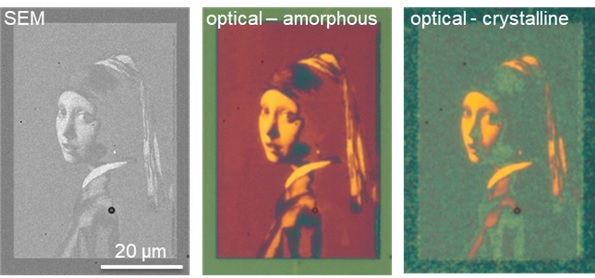These paintings show the future of optoelectronics

Scientists at the Zernike Institute for Advanced Materials, University of Groningen, have just reproduced two famous paintings at the micrometre scale. This wasn’t just a homage to Dutch masters Johannes Vermeer and Vincent van Gogh, but a proof of principle in manufacturing minute optical systems.
FSE Science Newsroom René Fransen
The canvas for these reproductions was formed by a layer of reflecting gold. On top of that, scientists led by professor of Nanostructured Materials and Interfaces Bart Kooi deposited a thin film of Sb2Se3 (antimony-selenium). Light-reflecting off the gold and passing through the film then takes on different colours, depending on the thickness of the film – just like a drop of oil on water will produce colourful reflections.

Lithography
The pictures were first transformed into a greyscale image. An ion beam was then calibrated to mill the thin film to a depth that corresponded to the greyscale with nanometre precision. Light that is reflected through the thin film takes on a colour that depends on the local thickness of that film, resulting in a real colour image of the ‘Girl with a Pearl Earring’ by Vermeer (and also van Gogh’s Starry Night, not shown here).
This miniature art was created as a proof of principle, to show that ion beam milling can create nanometre-scale pixels with continuous height differences, something that isn’t possible when using traditional techniques like lithography. As the Sb2Se3 thin film is a phase-change material, it is also possible to change the properties of the pixels by switching their structure using electric pulses.
These tiny pixels could perhaps one day be used in displays, but will more likely be applied to create optical chips and other applications in optoelectronics.
The research was published in the journal Advanced Materials on 1 September.
| Last modified: | 25 October 2023 11.02 a.m. |
More news
-
24 March 2025
UG 28th in World's Most International Universities 2025 rankings
The University of Groningen has been ranked 28th in the World's Most International Universities 2025 by Times Higher Education. With this, the UG leaves behind institutions such as MIT and Harvard. The 28th place marks an increase of five places: in...
-
05 March 2025
Women in Science
The UG celebrates International Women’s Day with a special photo series: Women in Science.
-
16 December 2024
Jouke de Vries: ‘The University will have to be flexible’
2024 was a festive year for the University of Groningen. In this podcast, Jouke de Vries, the chair of the Executive Board, looks back.
